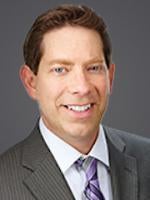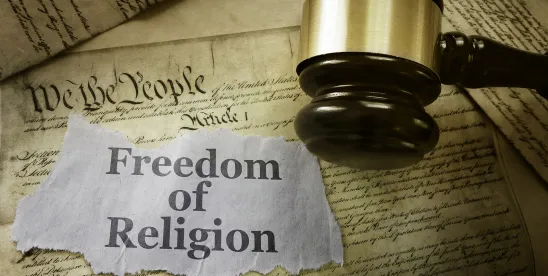In July 2025, the U.S. Office of Personnel Management (OPM) issued two important memos regarding religious accommodations and religious expression in federal workplaces. Although these memos apply only to federal agencies, they increase the likelihood that the U.S. Equal Employment Opportunity Commission (EEOC) will adopt similar guidance for private employers in the future.
Quick Hits
- In mid-July 2025, OPM issued a memo that emphasizes federal agencies’ obligations to provide religious accommodations and identifies types of religious accommodations agencies should consider.
- Two weeks later, OPM issued a memo that expands religious expression in federal workplaces.
- The OPM memos align with recent executive orders and guidance from the Trump administration related to religious freedoms, as well as EEOC enforcement priorities, and may foreshadow further guidance and directives applicable to private sector workplaces.
Introduction
The First Amendment of the U.S. Constitution prohibits the government from establishing a state religion or favoring one religion over others. In addition, Title VII of the Civil Rights Act of 1964 bans employment discrimination based on religion and other protected characteristics. Federal agencies and private employers long have been required to engage in a good-faith interactive process with employees to explore reasonable accommodations for sincerely held religious beliefs and provide such accommodations unless they impose an undue hardship. Prior to 2023, the standard for establishing such undue hardship was minimal. In 2023, however, the Supreme Court of the United States ruled in Groff v. DeJoy that employers must prove a substantial burden to justify not accommodating a religious belief or practice.
Federal Workplace Religious Accommodations
On July 16, 2025, OPM issued a memorandum providing guidance to federal employers regarding “Religious Accommodations for Religious Purposes.” The OPM memo “encourage[s]” agencies “to adopt a generous approach to approving religious accommodations, prioritizing employee needs while maintaining operational efficiency.”
OPM specified that federal agencies must engage in a good-faith interactive process when an employee requests a religious accommodation and reminded agencies that they should document the interactive process.
The memo’s list of religious accommodations includes flexible work schedules, scheduled breaks, credit hours earned under flexible work schedules, annual leave, earned compensatory time off for overtime work, leave without pay, and other time off.
The memo specifically encourages agencies to consider teleworking as a typically “low-cost solution … that does not impose substantial operational burdens.” OPM made clear that agencies would have to justify denying telework for religious purposes with “evidence of significant operational impact.”
OPM did not provide specific examples of undue hardship. Instead, it reminded agencies that undue hardship consisted of “substantial increased costs in relation to the conduct of [an employer’s] particular business” and that agencies “may not deny requests based on minor inconveniences.”
Federal Workplace Religious Expression
On July 28, 2025, OPM issued a memo to federal agencies regarding “Protecting Religious Expression in the Federal Workplace.” OPM emphasized that the memo should be read in conjunction with its reasonable accommodation guidance of less than two weeks prior and that “[a]gencies should allow personal religious expression by Federal employees to the greatest extent possible unless such expression would impose an undue hardship on business operations ….” (emphasis added). OPM also instructed agencies to review and, if necessary, revise their internal policies “to ensure that they appropriately protect religious expression.”
The OPM memo explains that federal employees “must be allowed to engage in private religious expression in work areas to the same extent that they may engage in nonreligious private expression.…” It continues, “Agencies may, however, reasonably regulate the time, place and manner of all employee speech, provided such regulations do not discriminate based on content or viewpoint.” The OPM memo, citing Groff, further maintains that any individual “coworker’s dislike of religious practice and expression in the workplace … is not cognizable to factor into the undue hardship inquiry.’”
The new memo provides these examples of conduct for which agencies cannot discipline or fire a federal worker:
- displaying and using religious books or icons;
- having prayer groups or scripture studies with fellow employees during off-duty time;
- having religious conversations with coworkers during work breaks, including attempting to persuade others of the correctness of certain religious views, if such efforts do not rise to the level of harassment;
- inviting coworkers to worship at the employee’s place of worship, even if they belong to a different faith;
- directing prayers or religious expressions at members of the public;
- having religious expressions or items in areas accessible or visible to the public; and
- expressing unwillingness to engage in religious conversations in the workplace.
Under the memo, agencies do not have to allow religious expressions if they create a hostile work environment or interfere with operations or efficiency of work. Religious speech could be considered harassment if it is sufficiently severe or pervasive to create a hostile work environment, according to the EEOC’s Compliance Manual on Religious Discrimination. However, there has been a steady rise in employee objections to various policies, programs, statements, stances, and activities over the last few years. Those types of objections normally would not rise to the level of harassment described in the memo.
Potential Conflict With Existing EEOC Guidance Regarding Supervisor Religious Expression
OPM’s stance regarding supervisors’ rights to workplace religious expression may be inconsistent with established EEOC guidance for private employers. Although OPM makes clear that federal agencies should not distinguish “[t]he constitutional rights of supervisors to engage in such [religious] conversations … from non-supervisory employees by the nature of their supervisory roles,” the July 28, 2025, memo does not address the inherent power imbalance in the supervisor-employee relationship.
In contrast, the EEOC’s guidance on “Best Practices for Eradicating Religious Discrimination in the Workplace,” specifically notes, “While supervisors are permitted to engage in certain religious expression, they should avoid expression that might—due to their supervisory authority—reasonably be perceived by subordinates as coercive, even when not so intended.”
The EEOC’s Compliance Manual on Religious Discrimination underscores the risks to private employers when supervisors engage in workplace religious expression. If a supervisor’s religious expressions rise to the level of harassment that results in a tangible employment action, the employer will be automatically liable for the supervisor’s conduct.
Next Steps
OPM’s two new memos follow President Donald Trump’s February 2025 Executive Orders 14202 and 14291 establishing a federal task force and federal religious liberty commission to eliminate anti-Christian bias across all federal agencies and protect religious freedoms. The EEOC, under Acting Chair Andrea Lucas, has embraced this focus with enforcement priorities that include “protecting workers from religious bias and harassment, including antisemitism and anti-Christian bias.”
While the two new memos apply only to the public sector, the administration’s focus on workplace religious issues means that the EEOC at some point may expect, encourage, or compel private employers to adopt similar practices and policies. Private employers may wish to stay abreast of any new developments, including executive orders or federal guidance, that could potentially impact the private sector in the future with regard to religious speech, activities, accommodations, and objections by employees.







 />i
/>i

